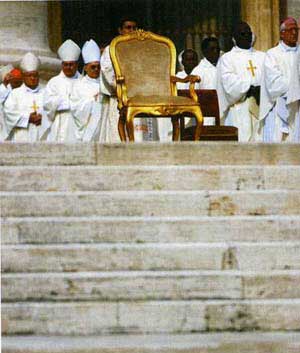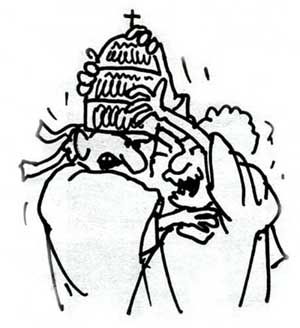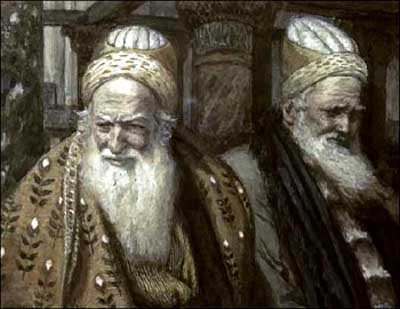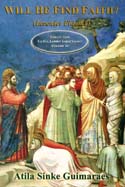 |
Traditionalist Issues
Sede-Vacantism?
Dan O'Connell
 |
Remember when liberals popularized Nietzsche's saying “God is dead." Then, after Nietzsche's death some astute wise-cracker painted on a wall somewhere, "Nietzsche is dead. - God." Well I have thought a lot about the sede-vacantist point of view and although I haven't come up with something as succinct as "Nietzsche is dead. - God," I do have few thoughts to share on the subject.
First of all, what is sede-vacantism? As I understand it, the sede-vacantist is a Catholic who believes in all the rights and authority of the Papacy but does not believe that the man currently holding the title of Pope, His Holiness Benedict XVI, is really the Pope; he is fundamentally someone posing as the Pope, an impostor, although the rest of the world accepts the man as the Pope. Hence the Latin term sede-vacante, “the chair (of Peter) is vacant.”
Now on one level the sede-vacantist position is the reciprocal of most of the world's modernist Bishops who believe Benedict XVI is the Pope, but they don't believe in all the rights and authority of the Papacy. A ruse they conveniently employ under the concept of Collegiality.
There is also a similarity between the sede-vacantist and what I'll call the Novus Ordo Conservative (NOC). They both make the same fundamental error. That being, that "a Pope can do no wrong." If it were true that a Pope can do no wrong it would mean a forfeiture of his free will. The sede-vacantist and the NOC both share this false premise - albeit they draw different conclusions. For example, the NOC is not bothered when a Pope kisses the Koran, or announces to the world that the UN is the last hope of mankind, or allows topless women on the altar as part of the liturgy, or is anointed by a pagan witch doctor, or leads Jews to believe they don't need to convert to be saved. The NOC will clap and applaud and shout yippee because he's the Pope and "a Pope can do no wrong.”

The see of Peter would be empty... |
On the other hand, the sede-vacantist, also believing “a Pope can do no wrong,” is understandably shocked by all of the above (all actual papal incidents) and knowing that these things are clearly against the Faith, draws the conclusion that since "a Pope can do no wrong" and he is doing this bad stuff, ergo he cannot really be the Pope.
The basic problem with the premise "a Pope can do no wrong" is that it denies the Pope's God-given free will. The Church Militant, the Church on earth, at any one moment contains both saints and sinners. Catholics from every walk of life can be either one or the other depending on how they respond to the grace that God generously offers them. The first obligation of every man is the salvation of his own soul, be he layman, priest, Prelate or Pope. A man does not give up his faculty to choose good or evil, his free will, when he becomes Pope.
To go on, the sede-vacantist reasoning goes something like this: “If a Pope becomes a heretic he is no longer a Catholic; and if he is not a Catholic he automatically loses the office of Pope."
On the surface this logic may seem attractive, but it actually poses some problems that make it untenable. For example, let's say a Pope, orthodox in all ways, one morning wakes up and decides that the Eucharist is only bread and wine and not the actual Body and Blood of Christ. A sede-vacantist is confronted with the question: When is the precise moment when he loses the office of Pope? When he thinks the error? When he says the error privately? When he speaks it publicly? When he writes it down or perhaps when he has it published? Now at one of these moments of time, although it’s not clear which, the sede-vacantist believes the Pope loses his office.
Let's say this Pope fully embraced this error in his mind and even told a priest, who was one of his aides, about this new (false) belief. So then what happens if the next day, he sees the error of his way, truly repents and again embraces the Church's teaching? He runs to the aide and says:
"Hey, you know what? Don't mention what I said to you yesterday. I didn’t know what I was thinking. That was wrong as can be; it was error. I've repented and gone to confession. Just forget about it. Okay?"
Now the sede-vacantist has to decide is this a Pope or not. He clearly held a false idea, publicly for approximately 24 hours. Other than the aide nobody else in the world knew anything about it and the aide said it was forgotten. If he automatically loses the papal office at some unidentified moment, but then wholeheartedly repents, does he automatically regain the office or would he have to be re-elected? It's really very absurd. If the sede-vacantist position were true, we could never know for sure if anyone was Pope regardless of how orthodox he may be on the surface.
Now, what if it worked out differently? What if the aide responded differently when the Pope asked him not to mention the incident?
Aide: “Now wait a minute, Ralph, I can't do that."
Pope: “Ralph? What do you mean, Ralph? Nobody's called me that in 30 years!"

You are no longer the Pope... Yes, I am. |
Aide: "I understand, but I can't very well call you Holy Father after what you said yesterday. You see, you lost your office."
Pope: "Forget about yesterday. I made a mistake. Please, don't bring it up again."
Aide: “But Ralph, I'm a sede-vacantist and I have to inform you that..."
Holy Father (interrupting): "Don't call me that! A what?”
Aide: "A sede-vacantist, and you lost the papal office yesterday.”
Pope: "Say that again. You're a ... whatist?"
Aide: "A sede-vacantist, someone who believes if a Pope is in error he is no longer a Pope. And yesterday you said that terrible thing..."
Pope: "I know, I know."
Aide: "So, today you're not the Pope; you're just... Ralph, oops, sorry."
Pope: "But I have whole-heartily repented."
Aide: “Doesn't matter, you're out.”
Pope: "But what about St. Peter, he denied Our Lord outright and he repented. Our Lord never said he wasn't an Apostle or Pope!"
Aide: "Listen, we sede-vacantists have studied St. Robert Bellarmine and we know, according to him … well, you're out."
So on and on say the sede-vacantists. The fact of the matter is the Pope cannot lose his office unless by an act of God, as Pope Boniface VIII clearly and infallibly teaches in Unam Sanctam (Novemebr 18, 1302):
"Therefore, if the temporal power (the State) errs, it will be judged by the spiritual power (the Church); but if a minor spiritual power errs, it will be judged by a superior spiritual power; but if the highest power of all (the Pope) errs, it can be judged only by God, and not by man."
What if God delays in correcting the situation? Well, we wait and pray and follow what the Church has always taught.
Contemporary historical examples
Current history gives us a number of examples of the proper attitude during times of hierarchical irresponsibility. The first I will point out is Padre Pio. He is a very good example because he is recognized by NOC's and sede-vacantists alike as a great Catholic priest, mystic and miracle worker. Now, Padre Pio lived during the pontificate of two of the Popes that the sede-vacantists love to classify as non-Popes: John XXIII and Paul VI. He lived only a short distance from the tumult known as Vatican Council II. Did Padre Pio see and read about all the abuses in the Church? Yes, he did, yet he never even hinted such a thing that John XXIII or Paul VI were not Popes. I am willing to bet that this Italian mystic and miracle worker - with his Italian temperament - would treat as insane anyone who suggested the idea.
Do sede-vacantists have greater insight than Padre Pio who bore the physical wounds of Christ? Granted, being a mystic or even a canonized saint does not automatically grant someone infallibility. So let's push ahead and see if Church History gives us any infallible lessons on the topic.
But before that, I must mention another important recent example. The late, great Fr. Leonard Feeney, SJ, was the greatest theologian of the 20th century. Now, I understand that many readers of this article do not hold Fr. Feeney in such high esteem, but the purpose of this essay is not a defense of Fr. Feeney and the heroic stand he took on the Church's infallibly defined dogma “No salvation outside the Church.” (1) I mention him only because most sede-vacantists hold him in high regard.
Fr. Feeney also lived under the pontificates of John XXIII and Paul VI, dying a short time before JPII became Pope in late 1978. Fr. Feeney took all the abuse and blows that come when a man stands up for Catholic dogma in a world gone mad with religious indifferentism and false ecumenism. Yet he never suggested or hinted that John XXIII or Paul VI were not Popes.
High Priest Caiaphas was confirmed by the Holy Ghost
Finally, the best example of all comes from a much earlier era - from the infallible source I alluded to earlier. To set the stage for this example I need to quickly mention a wonderful book titled The Continuity of Religion by Bishop Jacques Bossuet, written around 1675 as part of a course of study for the young Dauphin at the request of the Dauphin's father, King Louis XIV of France. The aim of Bishop Bossuet's work was to teach the Dauphin "two dominant facts of History: the first was to bring out of the past the lesson of the authority, the sanctity and the continuity of religion." The second was to show the Providence of God over all nations.

Our Lord accepted Annas and Caiaphas as High Priests
painting by Tissot |
Our concern is with the first point, for, in it, Bishop Bossuet demonstrates that there has always been only one true religion that runs unbroken from Adam and Eve to the present and beyond. Bishop Bossuet deftly points out in regard to the election of the tribe of Levi: "Thus the altars have their ministers, the Law its advocates., and the continued existence of God's people is testified by the succession of its pontiffs, which goes on without interruption, from Aaron the first of them." (Loreto Publications edition, p. 34)
Thus if, as Bishop Bossuet says, Aaron, the High Priest was (let's say mystically anyway) our first Pope, then that would also make Caiaphas a Pope. Caiaphas, I'm sure you recall was High Priest when God Almighty Incarnate, Jesus Christ, walked the streets of Jerusalem. Caiaphas was part of the unbroken continuity, the last High Priest/Pope before the hand-off to St. Peter and the New Covenant. The point I’m making may be clear to you already, but please allow me to elaborate.
So, what did Pope Caiaphas' report card look like? Well, the man basically ran amuck. First, he knew all the Traditions: Noah, Abraham, Moses, David, all the Prophets and all their teachings, about the Messiah to come, Jesus Christ. What did he do? He ignored them all. He should have been the first to recognize the Messiah, but instead he harassed and bitterly persecuted and blasphemed the Messiah, assembled an evil council to plot His death and, finally, bullied the Romans into torturing and cruelly crucifying Him in untold agony.
So, the big question is: Did the Lord Jesus Christ ever intimate that Caiaphas was not the High Priest/Pope? The answer is: no. The Lord Jesus Christ, who had more reasons than anyone to be a sede-vacantist, was not. When it comes to apostasy and heresy, Caiaphas pretty much takes the cake, but Our Lord never challenged the fact that he was High Priest/Pope.
In fact, the Scriptures repeatedly affirm the fact that the heretic, apostate Caiaphas was indeed High Priest. One of best passages to point this out is: "But one of them, named Caiaphas, being the high priest that year, said to them; 'You know nothing. Neither do you consider that it is expedient for you that one man should die for the people, and that the whole nation perishes not.' And this he spoke not of himself: but being high priest of that year, he prophesied that Jesus should die for the nation” (Jn. 11;49-51).
Okay… so here we have the Holy Ghost not only confirming the fact that the heretic, apostate Caiaphas is indeed High Priest (Pope), but He is also actually prophesying through him. Well doesn't that beat all! In other words God is still God and He can use for His infinite purposes a straying Pope or an apostate High Priest/Pope.
If our Lord Jesus Christ rejected sede-vacantism, why do any of us, who love Him, believe that we should embrace it? Our Lord Jesus Christ gave us the proper example when He said in Matthew (23: 2-3): "The scribes and the Pharisees have sat on the chair of Moses. All things therefore whatsoever they shall say to you, observe and do: but according to their works do ye not; for they say and do not." No sede-vacantism there.
1. Pius XII in his 1943 encyclical, Mystici Corporis Christi, wherein he strongly reaffirms the Church's teaching in Boniface VIII’s Unam Sanctam was timely in that it paralleled Fr. Feeney's life work of defending the pivotal, thrice-infallibly defined Church dogma of "No Salvation outside the Church."

Posted September 17, 2008

The pleasure TIA has to publish collaborations of our guest columnists does not imply that it endorses all the opinions expressed in their articles.
Return to TOP

Related Topics of Interest
 How a Catholic Should Act Before Bad Popes How a Catholic Should Act Before Bad Popes
 Resistance and Sede-Vacantism Resistance and Sede-Vacantism
 Resisting the Novelties of the Conciliar Church Resisting the Novelties of the Conciliar Church
 Declaration of Resistance to the Vatican Ostpolitik Declaration of Resistance to the Vatican Ostpolitik
 Be Thou Peter! Be Thou Peter!
 Quo Primum and Novus Ordo Quo Primum and Novus Ordo
 The Novus Ordo Mass Broke the Identity of the Church The Novus Ordo Mass Broke the Identity of the Church

|

Traditionalism | Hot Topics | Home | Books | CDs | Search | Contact Us | Donate

© 2002- Tradition in Action, Inc. All Rights
Reserved
|
 |
|
